 |
 |
 |
History
of the Club - The Seventies
1969-79
As the 1960's drew to a close, there was little dispute as to which was
England's premier club side: Leeds United had won the League championship
in April 1969 with a record points total, suffering just two defeats and
conceding 26 goals. For United manager Don Revie, the title was the culmination
Revie refused to rest on his laurels after the title triumph. He broke
the British transfer record when he paid £165,000 to relegated Leicester
City for the signature of England Under-23 goal poacher Allan Clarke.
In earlier years, the board had hesitated when Revie asked them to break
the transfer record to sign Alan Ball; by 1969, none of the directors
were prepared to deny Revie even his most unreasonable request. Over the previous decade, United had generally found goals hard to come
by and Revie reasoned that if he seriously hoped to win the European Cup,
Leeds would need a cutting edge. Clarke was renowned for his clinical
efficiency in front of goal and seemed to be the man to solve the problem,
though he was reputed to be something of a disruptive influence in the
dressing room. Clarke's arrival led to Mike O'Grady leaving for Wolves
after the winger lost his place to a rejuvenated Peter Lorimer. The early signs were promising: United won the curtain-raising clash
for the FA Charity Shield by beating Cup winners Manchester City 2-1 and
then broke a club record when they netted ten against Norwegian part timers
Lyn Oslo on their European Cup debut. Clarke scored twice, but centre-forward
Mick Jones stole the show with a hat trick. Leeds were certainly a stronger attacking force now, scoring ten in two
League matches against Nottingham Forest and winning 3-0 in both legs
of their European Cup pairing with the powerful Hungarians, Ferencvaros. United spent most of the season locked in a two way tussle with Everton
for the League championship, and a 5-2 victory at Stamford Bridge in January
1970 against Chelsea, also in the running, signalled the strength of their
challenge. They took that form into the FA Cup, where fortune favoured
them with draws against lowly opposition in Swansea, Sutton, Mansfield
and Swindon. By the beginning of March, Leeds looked set fair for the unprecedented
treble of League, Cup and European Cup. It was their very consistency,
ironically, that was their greatest threat. The season was drastically
foreshortened by the decision to give Sir Alf Ramsey's England team a
lengthy period to acclimatise to the alien conditions they would face
in Mexico as they defended their World Cup trophy. When compounded by
United's progress on three fronts, this meant appalling fixture congestion
for Revie's charges. The three match marathon required to see off Manchester United in the
FA Cup semi final was the straw that broke the camel's back. In the fourteen
days between 21 March and 4 April, Leeds had to play eight times. Don
Revie decided enough was enough and surrendered the chase for the title.
He began relying almost entirely on his reserve pool for League games,
a decision that brought a £5,000 fine from the Football League. When Revie
did deign to play first teamers his reward was to see England full-back
Paul Reaney suffer a broken leg against West Ham. The injury kept Reaney
out of the remaining weeks of the season as well as England's World Cup
campaign. Revie's gamble of concentrating on the knockout trophies backfired. With
his men dropping through physical and mental exhaustion, they underperformed
badly and lost both legs of the European Cup semi final against Celtic,
despite a memorable goal at Hampden from Billy Bremner. United recovered sufficiently to hammer Chelsea on a pudding of a Wembley
pitch in the FA Cup final. Eddie Gray tortured his marker, David Webb,
but Leeds couldn't score the goals their play deserved and were undone
by a late equaliser from Ian Hutchinson. In the Old Trafford replay, their dominance was not quite so absolute,
but they had still shown enough to merit victory before Chelsea fought
back to first equalise and then snatch a dramatic winner through Webb
in a heartbreaking finale to a remarkable season. Captain Billy Bremner was voted Footballer of the Year, while Revie was
awarded both an OBE and the Manager of the Year trophy, but these were
scant recompense for such major disappointments. Seemingly none the worse for a series of events that would have unhinged
most clubs, Leeds were quickly back to peak form at the start of the 1970/71
campaign, once again setting the pace in the chase for the League title. They stormed away from the very first game, leaving the pack trailing
in their wake. A dogged Arsenal team eventually emerged as the only serious
challengers as they shamelessly aped United's historic trademarks of defensive
resilience and narrow victories. They chased them remorselessly throughout
the autumn months and pressed their pursuit ever more tenaciously in the
spring, launching an indomitable assault on a gap that had once seemed
unbridgeable. Revie was deprived of both Bremner and Gray for most of the spring and
United's self assurance was badly shaken by a shock 3-2 defeat at Fourth
Division Colchester United in the FA Cup fifth round in February. Two
months later, perverse refereeing from Ray Tinkler provoked a riot at
Elland Road when West Bromwich Albion inched out a controversial 2-1 victory. Revie was beside himself with anger at Tinkler's display, accusing him
bitterly of ruining nine months' hard work. The More problematic, however, were the way the two matches undermined their
challenge, though United responded stoically by winning their remaining
three league games without conceding a goal. It was not enough, however. Arsenal were consistency personified in the closing weeks; even when
Leeds beat the Gunners with a controversial goal by Jack Charlton at Elland
Road at the end of April, it could not halt the Londoners' push for the
title. Despite amassing 64 points, United had to be content with another
runners up spot after Arsenal won their final game at Tottenham with a
goal from Ray Kennedy. They rubbed further salt in the wound by doing
what Leeds had often promised but always failed to do, becoming only the
second club in the Twentieth Century to complete the League and Cup double. United had at least some recompense when they won the Fairs Cup for the
second time. They beat Liverpool in a two legged semi final thanks to
a comeback goal by Bremner in the first leg at Anfield and beat Italian
giants Juventus on the away goals ruling after both legs of the final
ended even. It was something of a hollow feeling after coming so close
to regaining the League title, but after a couple of years without a trophy
they at least had something to mark their efforts. The crowd's behaviour during the defeat to West Bromwich Albion led to
disciplinary action from the Football League; Elland Road was closed for
a month and United had to stage the first four 'home' League fixtures
of 1971/72 in the stadiums of various other Yorkshire clubs. They only
dropped two points in those matches, but in a tight race for the league
title, the shortfall proved costly indeed. When United were eventually allowed to resume action at Elland Road,
they found outstanding form, dropping just two further points all season.
On their travels, they were considerably less impressive and by early
October they had been beaten four times. It was their poorest start for
years and for once European competition provided minimal distraction.
After winning 2-0 in Belgium against Lierse in the first leg of a UEFA
Cup-tie, Revie, considering the outcome a formality, chose to draft in
a number of reserves for the home match. The Belgians thrashed United
4-0. Revie's thoughts had turned to rebuilding his team; in early 1970 he
had offered Sutton centre-half John Faulkner the opportunity to become
a long term replacement for the ageing Jack Charlton and later signed
young Morton striker Joe Jordan for a pittance. Now, he agreed a record
£177,000 fee with West Brom for their 21-year-old Scottish midfielder
Asa Hartford. But the move was scuppered when the medical examination
identified a heart problem. Hartford went on to make a fine career for
himself with Manchester City and Everton and featured in two World Cup
finals with Scotland. United were not deterred by the setback and their football reached new
heights in the spring of 1972. The 5-1 hammering of Manchester United
and a breathtaking 7-0 slaughter of Southampton were televised on Match
of the Day, allowing a nationwide audience to lap up the breathtaking
football United were now dishing up. The style and cocksure manner of
their displays, particularly in the drubbing of the Saints, and their
introduction of gimmicky numbered stocking tags quickly led to them being
branded 'Super Leeds'. The later stages of the Southampton game saw them
imperiously playing keep ball with showy flicks and tricks, rubbing in
their superiority. It was memorable stuff as United swept all before them,
pushing forward confidently to what seemed an inevitable League and Cup
double. However, they were forced to face the run in without England left-back
Terry Cooper, who suffered a broken leg against Stoke City. He was out
of action for two years and was never the same player again, though he
was given a sentimental recall to the England team in 1974. The versatile
Paul Madeley smoothly plugged the gap in defence. A 3-0 defeat of Second Division Birmingham City in the FA Cup semi-final
at Hillsborough earned United a Wembley date with Arsenal in the Centenary
final, a match attended by the Queen. The Whites were thirsting for revenge
after losing out to Gunners in the League a year previously and marked
the occasion by winning the trophy for the first time after Allan Clarke
headed home the only goal. David Harvey played in both semi final and
final having secured the spot as first choice keeper after Revie finally
lost patience with the inconsistency of Gary Sprake. Revie's men had little opportunity to bask in the glory of their victory;
the League perversely refused United's request that their final League
game should be postponed to allow the players to recover. They travelled
straight from Wembley to Wolverhampton for a match against Wolves on the
Monday night, requiring a draw to win the title. An inspired Wanderers team won 2-1 after a thunderous and emotion-soaked
clash, leaving Brian Clough's Derby County, who had already completed
their programme and were sunning themselves on a beach somewhere, to claim
the championship. Leeds were consigned to the runners up spot for the
third successive season. Revie was distraught, complaining of the Wolves defeat, "It's just too
much. We should have had three clear penalties. But I was proud of the
team. I don't know where they got the energy from in the second half." During the summer of 1972, Revie continued to rebuild. Veteran centre-half
Jack Charlton was now 37 and close to retirement while Terry Cooper's
broken leg would keep him on the sidelines for almost two years, so United
badly needed some defensive reinforcements. Revie's solution lay close
to home as he signed Huddersfield Town defenders Roy Ellam and Trevor
Cherry. Cherry enjoyed a long and successful career at Elland Road, but Ellam
never made the grade, looking completely out of his depth. Revie quickly
admitted his mistake and turned to another option, Gordon McQueen, a raw
20-year-old, who had been signed from St Mirren for £30,000. Paul Madeley
and Charlton shared the No 5 shirt between them for the majority of the
1972/73 campaign. Eddie Gray's 18-year-old brother Frank was given his debut, though it
would be another two years before he was ready to claim a regular The season began badly - United lost 4-0 at Chelsea on the opening day.
Norman Hunter was missing through suspension and Cherry and Ellam struggled
to forge any sort of understanding with their new colleagues. Mick Jones
went off injured in the first half and when David Harvey was also forced
to withdraw with concussion, Leeds were left to battle for more than an
hour with ten men, as Peter Lorimer took up the goalkeeper's gloves; he
never had a prayer. The defeat set the tone for a disappointing campaign. Despite being in
contention for the title for most of the season, United struggled to demonstrate
that they were actually capable of winning the championship, eventually
trailing in third behind Liverpool and Arsenal. A season that began miserably also ended depressingly. Leeds were the
hottest favourites in years when they reached the FA Cup final. They were
pitted against Second Division Sunderland, managed by Bob Stokoe, a bitter
critic of Don Revie. Stokoe had accused Revie of trying to bribe him in
the early 60s when he was a Bury player and had borne a grudge against
him ever since. United suffered one of the greatest shocks in the competition's history
- they were undone by a first half goal from Ian Porterfield and a miraculous
double save by keeper Jim Montgomery. Stokoe revelled in the victory,
dancing gleefully across the turf at the end to hug Montgomery as the
United party looked on in despair. Leeds had also qualified for the Cup Winners Cup final, but went into
the game missing key men through suspension and injury. Bremner, Clarke,
Giles and Eddie Gray were all unavailable, while the team were unsettled
by the news that Don Revie had agreed to take the manager's job at Everton. The match, in Salonika against AC Milan, was hugely controversial. Paul
Madeley was unlucky to be penalised for a soft challenge after five minutes
and Chiarugi's long range free kick somehow crept past David Harvey into
the net. United were denied a number of penalty claims and Norman Hunter
was dismissed for retaliation after being the victim of a series of niggling
fouls. Referee Christos Michas was rumoured to have been bribed by the
Italians and he certainly seemed to favour Milan, facing a chorus of boos
from his Greek countrymen at the end of the game. He was later banned
for life by UEFA. There was widespread talk during the summer that United were no longer
the force they once had been. The Sunderland defeat had scarred them badly
and critics pointed to signs of wear and tear. The young men of Revie's
early years had aged together and there were a number of claims that they
were over the hill. Elder statesman Jack Charlton, now 38, was one for whom time was up and
he called it a day. He retired to take over as manager of Middlesbrough,
whom he led to the Second Division championship at the first time of asking.
At the beginning of October, another old stager, Welsh international Gary
Sprake, moved on to Birmingham City in a six figure deal, a record for
a keeper. He was replaced by the little known David Stewart of Ayr United. Don Revie rejected Everton's overtures in the end and chose to remain
at Elland Road, his pride salved by an offer of improved terms from the
board. He had also turned down an offer from the Greek FA, determined
that his club would finally secure the second title they had missed out
on so often. He somehow managed to inspire his troops to a remarkable
swansong. Eddie Gray and Johnny Giles missed most of the campaign through injury,
though Gordon McQueen, Terry Yorath, Joe Jordan and Trevor Cherry proved
more than adequate reinforcements, providing great support for the usual
suspects. Bremner, Jones, Clarke, Lorimer, Madeley and Hunter were in
imperious form as United swept all before them, earning unanimous acclaim
from the critics. Leeds went off in unstoppable fashion, winning seven games on the bounce.
They extended their unbeaten League run to 29 games, playing superlative
football. In the end, the psychological burden of months of front running
started to eat away at them, and draws were soon all too regularly punctuating
the results. FA Cup defeat in February against Second Division Bristol City hinted
that United might be human after all, but Revie maintained that the exit
would allow them to concentrate on securing the title, without the distraction
of hunting multiple trophies. In their 30th League game, on 23 February, Leeds took a 2-0 lead at Stoke
City and seemed likely to continue their unbeaten run, but the Potters
fought back with real verve to win 3-2. That brought back all the old
anxieties and paranoias; three further defeats in a poor spell of form
had Revie beside himself as Liverpool reeled in Leeds' lead with dogged
determination. However, United managed to rally at the death; when old rivals Arsenal
sprang a shock on 24 April by winning at Anfield it secured a second League
title for Leeds without their even playing. They could enjoy their ultimate
game, in London against Queens Park Rangers, under no pressure. Allan
Clarke scored the only goal of the game to see United home in some style.
They had wavered badly as the pressure got to them but in the end they
were the worthiest of champions. At their best in 1973/74, Leeds were
almost unplayable. That triumph was a marvellous parting shot for Revie. During the summer
he was appointed England team manager, taking trainer Les Cocker with
him. Joe Mercer had taken over as caretaker manager following the FA's
dismissal of Sir Alf Ramsey, but, after making clear his interest in the
position, Revie was a shoo in when the time came for a Revie's replacement at Elland Road was a controversial one; the manager
himself had nominated Johnny Giles as his successor, but the board, perhaps
fearing that Billy Bremner would see such a move as a personal snub, instead
appointed former Derby County manager Brian Clough as the new man. The appointment came as a major shock; Clough had long been a fierce
critic of Revie and United, accusing them of cheating and gamesmanship.
He seemed the unlikeliest of choices. Clough did little to endear himself to the United players, telling them
to throw their medals in the bin because they had obtained them dishonestly.
Following an ill-tempered Charity Shield match against Liverpool, which
saw Billy Bremner and Kevin Keegan sent off for fighting and United losing
on penalties, there was a poor start to the title defence with a single
victory from the first six games. When invited to do so by the directors, the players made their feelings
about Clough plain, and there was no going back. After just 44 days in
the job, Clough was shown the Elland Road door. He departed Yorkshire
with a substantial pay off and a binding promise that the club would pay
his income tax for the following three years; the board were left with
egg on their faces and a substantial hole in their wallets. Two of the players that Clough bought for Leeds, John O'Hare and John
McGovern, followed him to glory with Nottingham Forest. Clough's other
signing, Duncan McKenzie, who had joined for a club record £240,000 fee
from Forest, remained and became a cult figure at Elland Road with his
skills, trickery and poaching instincts. McKenzie had some other bizarre
talents: he could hurl a golf ball the length of the Elland Road pitch
and vault over a Mini. Bolton boss and former Blackpool and England captain Jimmy Armfield was
the board's choice to steady the United ship. They were too far off the
pace in the League to make a serious challenge and trailed in ninth, but
Armfield steered the team to the European Cup final. They overcame a strong
Barcelona side, Johann Cruyff and all, in the semi final. There was a
memorable draw in the second leg at the Nou Camp after United were reduced
to ten men when Gordon McQueen was sent off. Leeds enjoyed little luck in the Paris final against Bayern Munich, having
a Peter Lorimer 'goal' disallowed and being denied a clear penalty when
Franz Beckenbauer hacked down Allan Clarke. The Germans scored two late
goals, provoking frenzied reactions and a bout of missile throwing from
disgruntled United fans. UEFA took a dim view of the incidents and banned the club from European
competition for four years, something of an empty sanction as they had
failed to qualify for Europe for the first time in a decade. Jimmy Armfield later managed to get the ban reduced to two seasons, but
the evening symbolically closed the curtain on a remarkable period in
the club's history. Things would never be the same again. Long serving chief coach Syd Owen left Elland Road to assist former United
player Willie Bell, now manager at Birmingham. His replacement was former
Arsenal coach and England defender Don Howe as Armfield started rebuilding
in earnest: Terry Cooper left to join Middlesbrough, now managed by Jack
Charlton, while Johnny Giles became player manager at West Bromwich Albion. Of Revie's other stalwarts, Gary Sprake and Charlton had departed the
club in 1973; Mick Jones finally admitted defeat in October 1975 and announced
his retirement after years suffering with knee injuries; Mick Bates moved
on to Walsall in June 1976 after tiring of being the perennial reserve.
Billy Bremner, Norman Hunter and Terry Yorath left a few months after
Bates, while Paul Reaney, Allan Clarke, Joe Jordan and Gordon McQueen
stuck around until 1978. In the summer of 1979, Peter Lorimer and Frank
Gray both moved on, but brother Eddie, David Harvey and Paul Madeley were
still first team regulars at the end of the decade. In 1975/76 Terry Yorath assumed the No 10 shirt vacated by Giles, though
he had none of the Irishman's style and passing ability, relying instead
on guts, determination and spirit. He was always likely to suffer by comparison
and the unforgiving fans never fully warmed to him. Duncan McKenzie was a regular goalscorer throughout the campaign, partnering
Allan Clarke for the most part as Joe Jordan sat out the first half of
the campaign with injury. McKenzie top scored with sixteen goals in 39
League appearances, adding another in 4 Cup games. Leeds enjoyed a decent run of results through the autumn, opening with
five wins out of the first seven games and then from mid-November to mid-January
they won eight games out of nine. It was a false dawn and the positive
spell gave way to a succession of defeats. A run of one win in ten between
January and March knocked the stuffing out of the team. They did stage
a brief revival, hinting at a late surge, before securing just three points
out of the final ten to destroy any title aspirations. Nevertheless, they
did enough to finish fifth, nine points behind champions Liverpool. The domestic cup competitions brought only embarrassment as United suffered
defeats to inferior opposition. Second Division Notts County beat United
1-0 at Meadow Lane in the League Cup, while Crystal Palace of Division
Three won by the same score at Elland Road in the FA Cup. During the summer of 1976, Jimmy Armfield confided in McKenzie that he
planned to rebuild the team around him and Trevor Cherry. Unimpressed
by the promise, McKenzie departed for Anderlecht, dismaying supporters
who had loved his colourful flair. Terry Yorath, unsettled by barracking
from the fans, departed for Coventry and old stagers Billy Bremner and
Norman Hunter both moved on early in the new season, ending lengthy associations
with the club. It felt unmistakably like the end of an era. As a replacement for McKenzie, Armfield recruited one of the game's other
great entertainers, paying Sheffield United £240,000 for England schemer
Tony Currie. He also brought in young Burnley striker Ray Hankin in a
£170,000 deal. The manager was forced to give first team baptisms of fire
to youngsters like Peter Hampton, David McNiven, Byron Stevenson, Carl
Harris and The side's League form was patchy and they could only summon up fifteen
League victories all season. Their start was poor with one success in
the first nine matches. They rallied a little through the autumn but continually
struggled for goals. The Yorkshiremen faded away to finish tenth, their
lowest placing in thirteen years. On a more positive note, there was an exciting FA Cup run as United beat
Norwich (5-2 with a rare goal from Paul Reaney), Birmingham, Manchester
City and Wolves to reach the semi finals, where they were drawn with Manchester
United. They conceded two early goals in the Hillsborough semi and even
after Allan Clarke pulled one goal back, they couldn't recover. There was a desolate feeling about the club as an empty season drew to
a close. The crowd of 16,891 who watched the Elland Road draw with West
Ham on 26 April was the lowest since the club's return to the First Division,
bearing testimony to the depression felt by the United supporters. Undeterred by such dismal events, Armfield signed Aberdeen winger Arthur
Graham for a £125,000 fee and later paid £175,000 for Burnley's diminutive
midfielder Brian Flynn. Flynn formed a good midfield partnership with
Tony Currie, who enjoyed an outstanding 1977/78 season. Andrew Mourant described Currie as "a pivotal figure, the like of which
had never been accommodated in any Revie team. Much, sometimes too much,
depended on Currie's mood. He was an abundantly gifted midfielder; few
sights at Elland Road have been more enthralling than that of Currie cantering
about the pitch, spraying passes in all directions and indulging in his
speciality of spectacular long range goals. But sometimes he appeared
maddeningly languid; the authoritarian gang of three, Bremner, Giles and
Hunter, who might have chivvied him along, had gone. A hard-running game
was not Currie's favoured style and when he was disinclined to play, Leeds
looked pedestrian." With Graham, Currie and Flynn providing the ammunition, Armfield deployed
Joe Jordan and Ray Hankin as a ferocious twin battering ram up front as
Allan Clarke struggled for fitness. The side began the campaign well and at the turn of the year they were
looking on the verge of a push for the title, but then faded badly. Jordan had long been unsettled at Elland Road following the club's refusal
to sanction a transfer in 1975. "Leeds had an offer for me from Bayern
Munich after the European Cup final and I wanted to go. After that team
was broken up, I thought that was it. I wanted to play in Europe ... nothing
against Leeds. But they wouldn't let me and I was annoyed at that. I was
a bit disillusioned, as a lot of people were. I wanted to try and win
things and I really didn't think we were going to do that." Jordan demanded
a transfer and was sold to Manchester United for £300,000 in January. The following day, on a thoroughly depressing afternoon, Leeds were dumped
out of the FA Cup on their home soil by Manchester City. The game was
marred by crowd trouble as United fans poured onto the field to confront
City keeper Joe Corrigan after the visitors scored. Every bit as ugly
was the angry scuffle between Gordon McQueen and David Harvey as the pair
waited for a City corner. After the game, the FA imposed a ban on United playing FA Cup games at
Elland Road and the club fined McQueen for his lack of discipline. Within
days he had left to join close friend Jordan at Old Trafford with Leeds
pocketing £450,000. The fee was little consolation, and United fans were
irate at seeing two of their star men moving to such bitter rivals. It
sent an unmistakable signal that the Yorkshire club were no longer members
of the game's elite. Blackpool's Paul Hart arrived in March as a £330,000 replacement for
McQueen. He enjoyed some difficult early weeks, prompting more unrest
from the fans, though he later found his true form in a United shirt and
became a defensive mainstay. By the time of Hart's signing, Leeds' season was drifting to a disappointing
conclusion. They had reached the League Cup semi finals, but lost both
legs to a fine Nottingham Forest side. In the League, they finished ninth,
a minor improvement on the previous season, but still an unsatisfactory
outcome for some of the most passionate supporters in the country. The United directors, spoiled by the untrammelled success they enjoyed
for so long with Don Revie, decided that Jimmy Armfield could take the
club no further and sacked him a month before the start of the 1978/79
campaign. It was something of a surprise, for Armfield had made a decent
fist of the prickly task of replacing Don Revie's golden generation. After a brief period with assistant manager Maurice Lindley at the helm,
the board recruited former Celtic supremo Jock Stein to replace Armfield.
The Scot, who had led the Glasgow club to European Cup glory in 1967,
had been replaced at Parkhead by former skipper Billy McNeill and he was
disaffected with the Glasgow giants. It was generally accepted that Stein's
move was motivated more by resentment against his former employers than
any great desire to restore United's fortunes. He had previously rejected a number of offers from other English clubs
and at 55 he had no real hunger to uproot his family, but could not bear
to be offered a backroom job at Celtic and he accepted the United position
on August 21. It was reported that Stein hadn't been Leeds' first choice;
apparently Lawrie McMenemy had turned down an offer, leaving the directors
to There were high hopes at Elland Road that Stein, with his experience
and standing in the game, could take United back to the very top, but
it was soon clear that his heart wasn't in the move. He never signed a
contract and quit after six weeks to take control of the Scottish national
side. Sunderland manager Jimmy Adamson, who had come close to being appointed
England manager in the Sixties as replacement to Walter Winterbottom,
was Stein's successor, taking up the reins in October. Adamson inherited a difficult situation: the side had won just three
of its first ten league fixtures, and two of its greatest stalwarts, Paul
Reaney and Allan Clarke, had ended illustrious associations with Elland
Road, moving on to Bradford City and Barnsley respectively. The new manager
took a pragmatic early approach, claiming 'I want to see Leeds win first
and entertain second.' The early signs were good as Adamson hinted at being able to inspire
the side to better things. Under his guidance, United enjoyed a 16-game
unbeaten run in the league. That initial period included a hard-earned
draw away to champions elect Liverpool at the start of November, with
Bob Paisley's men requiring a late penalty to gain a share of the points. Despite his initial caution, Adamson also got Leeds playing some attractive
football; inspired by Tony Currie, they fought back from being 3-1 down
in the FA Cup to West Bromwich Albion to earn a 3-3 draw before going
out in a replay. United tailed off towards the end of the campaign, but managed to secure
a fifth place spot and a return to European competition by qualifying
for the UEFA Cup. They also reached the League Cup semi-finals, and looked a good bet for
Wembley when they took a 2-0 lead in the first leg at home to Southampton.
But the Saints fought back strongly to earn a 2-2 draw and then won 1-0
in the return at the Dell to eliminate United. Adamson set about the challenging task of reshaping his playing strength.
David Stewart and Peter Lorimer departed before the end of the campaign
and the summer months brought further exits in the shape of Tony Currie,
Frank Gray and John Hawley. Adamson had already paid out £357,000, a record
for an English full-back, when signing Kevin Hird from Blackburn in March,
and he continued to splash out the cash, signing Alan Curtis, Brian Greenhoff,
Gary Hamson, Wayne Entwistle and Jeff Chandler in the close season. These were modest names after those that had graced Don Revie's team
sheets. Paul Madeley, David Harvey, Eddie Gray and Trevor Cherry remained
in situ to preserve a link with the Revie years, but United were in the
throes of transition as the decade drew to a close. The early months of
Adamson's reign hinted they would be able to compete once more at the
highest level, with the promise of European competition getting the juices
going, but there was an unmistakable air of apprehension around Elland
Road as the decade drew to a close. 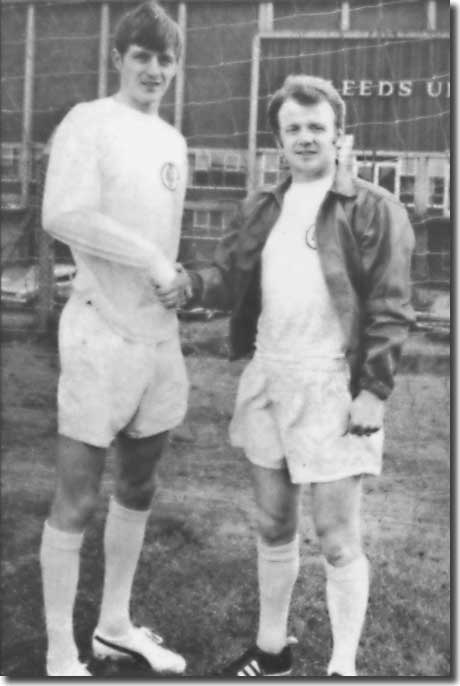 of
a remarkable rise to the summit that had begun with the club verging on
relegation to Division Three for the first time at the start of his tenure.
of
a remarkable rise to the summit that had begun with the club verging on
relegation to Division Three for the first time at the start of his tenure.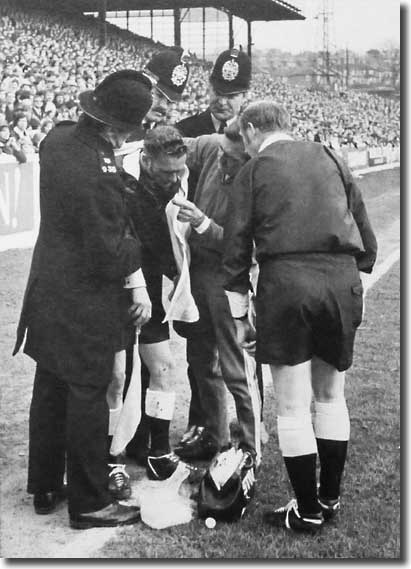 United
board were every bit as forthright in their comments and defended the
supporters' actions, prompting criticism from local businessmen and sanctions
from the Football League.
United
board were every bit as forthright in their comments and defended the
supporters' actions, prompting criticism from local businessmen and sanctions
from the Football League.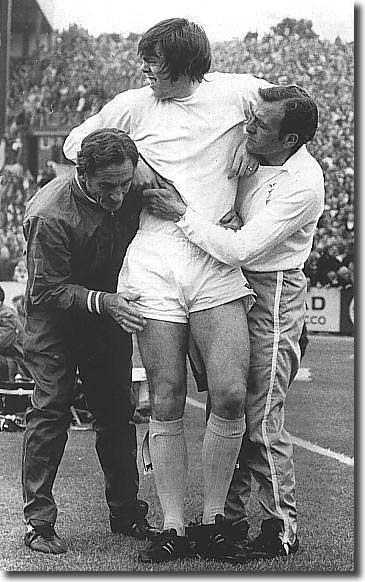 place.
place.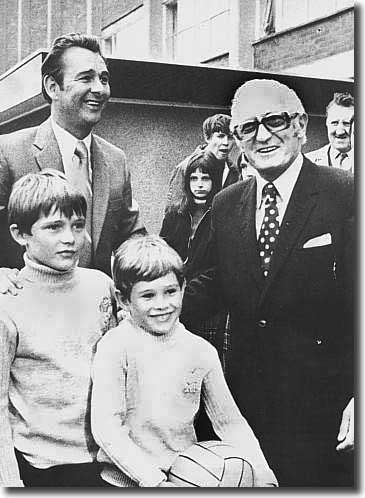 permanent appointment.
permanent appointment.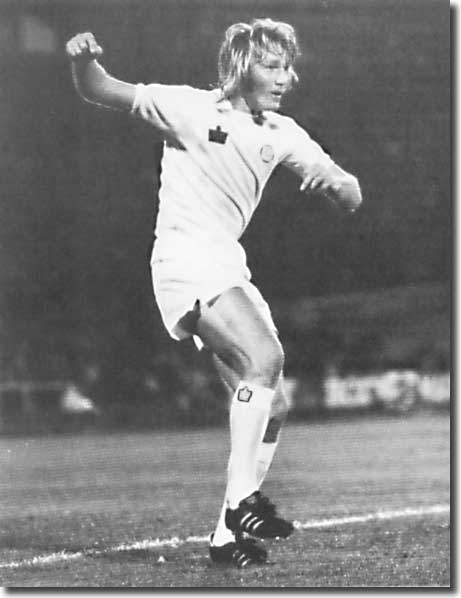 Gwyn
Thomas as United were rocked by a succession of injury problems.
Gwyn
Thomas as United were rocked by a succession of injury problems.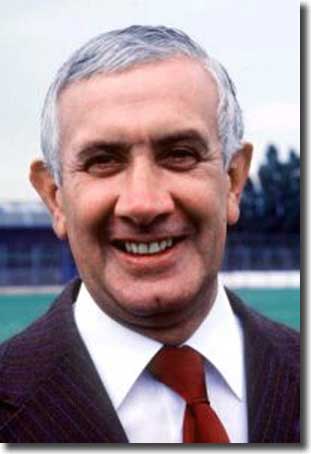 pursue
their next best option.
pursue
their next best option.